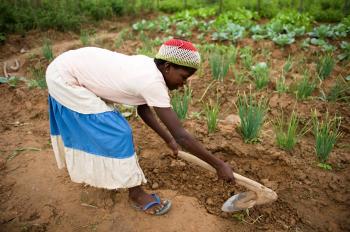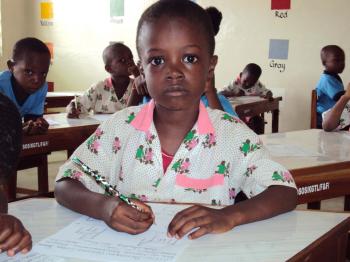Rural areas have been excluded from economic progress

Young woman tending her crop (photo: J. Lugtigheid)
These recurring conflicts, along with the extreme levels of poverty in the region, have led to a great rural exodus, with thousands migrating to southern urban areas. In the agricultural society of the North, women play an integral part in all farming activities, in addition to rearing children, household tasks, and fetching water and firewood. Fetching water alone can take up to 70 minutes each day and girls and women are responsible for this.
Gender inequality continues to affect the future of young girls
Despite recent government efforts to ensure free basic education for all, the gender disparity between enrolment and retention of girls and boys at all levels of education remains very pronounced in the Northern Region: around 65 per cent of females are estimated to have no form of formal education whatsoever. This is in part due to poverty and the amount of work expected of girls in the home, and in part due to early marriage, preference of boys, and religious practices. A lack of education impedes girls’ future socio-economic success and makes it harder for them to break the cycle of poverty as adults.
A phenomenon that has increasingly affected girls and women, especially those from poor, rural areas, is the branding and persecution of females as witches. This can affect babies as young as one month old. The baby, child or woman is accused of employing witchcraft to cause a death or illness, or even a business failure or financial difficulties, and is physically brutalised, tortured, abandoned or killed. In northern Ghana, there are so-called “witch camps” where these women take refuge, never to return to their communities. Around 1,000 women and 700 girls are estimated to be living here. Psychiatrists have said that in some cases, these women are suffering from mental illness; education on mental health issues is therefore also urgently required.
A phenomenon that has increasingly affected girls and women, especially those from poor, rural areas, is the branding and persecution of females as witches. This can affect babies as young as one month old. The baby, child or woman is accused of employing witchcraft to cause a death or illness, or even a business failure or financial difficulties, and is physically brutalised, tortured, abandoned or killed. In northern Ghana, there are so-called “witch camps” where these women take refuge, never to return to their communities. Around 1,000 women and 700 girls are estimated to be living here. Psychiatrists have said that in some cases, these women are suffering from mental illness; education on mental health issues is therefore also urgently required.
What we do in Tamale

Young girl in the classroom (photo: C. Ngo Biyack)
The SOS Medical Centre in Tamale treats up to 12,000 members of the community each year who would otherwise not be able to afford medical treatment. It provides basic health services, such as treatment of infectious and non-infectious diseases, surgery, and family planning services. The medical centre also provides food, medication and psychological assistance to individuals and families, including those affected by HIV/AIDS.
For children from the region who are no longer able to live with their parents, twelve SOS families can provide a loving home for up to 120 children. In each family, the children live with their brothers and sisters, affectionately cared for by their SOS mother.
The children attend the SOS Kindergarten together with local children from the community. They then go on to complete their primary education at the SOS Hermann Gmeiner School. Around 320 pupils from the children’s village and the neighbourhood attend the school. This way, children who grow up in an SOS family are integrated into the local community from a young age.